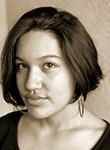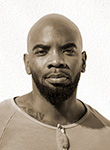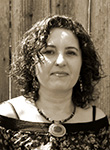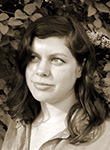Dedicated to the memory of Thomas B. Gay, educator, painter, poet, friend.
(read more about Thomas B. Gay)
Each spring we use this reading loop to bring to your attention writers and artists whose work you may be encountering for the first time. In this issue, the group includes several who have already made their way to other lists, anthologies, and small presses acclaiming their remarkable work. We expect that you will be glad to discover them now—and to hear of them again later in their careers, as you no doubt will.
| Alli Cruz | ||
| Alli Cruz’s poems are constructed in a collage of image and conversation, circling the concepts of learning and belonging. In “We Have To,” a mother teaches her daughter, “we do what we have to,” and tells her how to thrive like the flowers in her garden. In “Free Time” the speaker is at a shooting range, not “to learn, but to understand.” The shooting range within the poem is a liminal space, filled with uncertain intentions: “The bullet eats through the paper, which covers the face and chest of that cardboard outline of a man. What are we practicing for?” |  |
|
| Nicholas Cardell Gore | ||
| In the two poems collected here, Nicholas Cardell Gore examines the role of language in oppression. “They see the sky as mirror,” Gore writes in “Bring Back the Dead,” which urges for life to be returned to the lost. “Nigredo (The Precondition for Circumstance)” takes its title from the term for alchemical blackness, the confrontation of a shadow self. Gore’s poem is a twist on alchemical theory and the Black identity, asking, “How else could you explain how the Earth / Could have grown gold, if not from us?” |  |
|
| Katarzyna Jakubiak | ||
| Katarzyna Jakubiak’s story “Made of Sugar,” translated by the author from the original Polish, recounts a granddaughter’s memories of her grandfather’s bakery in Poland, a refuge of whimsy and bounty in a post-WWII landscape. With the increasing commercialization of Częstochowa, the narrator must reckon with their identity when the scent of the bakery, originally “the scent of the whole family for whom the bakery will become the only provider,” begins to dwindle away. |  |
|
| Andrew Koch | ||
| In his essay “Movies You Must See Before You Die,” Andrew Koch braids memories of his grandfather’s life and death with movie descriptions and film history. As a child, Koch’s speaker begins to collect a long list of watched movies. “For the first time,” his speaker says, “those two realms of thought converge in my mind: movies and dying. Or rather, [ . . . ] movies and existence and purpose.” This precise collection of memory, research, and description illustrates the complex ways humans strive to understand death, grief, and how to live with loss. |  |
|
| Romie Hernández Morgan | ||
| Romie Hernández Morgan’s poems center around familial storytelling. Generational stories, as told in the poem “A Fairy Tale,” are “passed down / from child to child.” The speaker’s great-grandmother becomes folklore, “her straight dark parted hair, her white skin / and fine nose. Her anger like an apple / in a story that we tell.” In the poem “And Should We Thank God,” listening is important, too, as the speaker starts, “We sit slightly stupefied— / paper plates damp with brisket fat / flowering in the trash. The baby / bouncing on her father’s knee / while he tells us.” |  |
|
| Stephen O’Donnell | ||
| The immediacy of each scene and voice in Stephen O’Donnell’s “Bleeding Among the Briars,” characterizes the story. Vivid vignettes depict the tribulations of a rural Irish family, confronting the question, “Must it be the same in the ever after?” The cast includes a single mother, her rowdy sons, a veteran uncle, a priest, and a bookie. Though the characters carom off one another from moment to moment, each has their own deep solitude—an impression best captured, perhaps, by the story’s departing image, “A black train pulling across a blackened land.” |  |
|
| Jessica Tanck | ||
| Jessica Tanck’s poems implore striking images to wrestle with belief, whether that’s the strong belief in all things clean, or the discomfort of attending an unfamiliar religious event as a child. The poem “Damned If” deals with the latter, stating that the speaker and her family had “joined a circle of clammy hands / while strangers rocked and shuddered.” In “Courtesy and Horror,” the speaker holds firm to her belief in “a clean thing.” When a co-worker writes on the speaker’s arm in sharpie, she “[takes] steel wool to the skin until / both it and ink were stripped.” |  |
|
Introductions texts appear in different sections of Blackbird but are organized in this alternative menu, a featured reading loop allowing easy navigation of related material.
A link to this “Introductions Reading Loop” menu appears at the bottom of every Introductions-related
page. You may also return to this menu at any time by visiting Features.